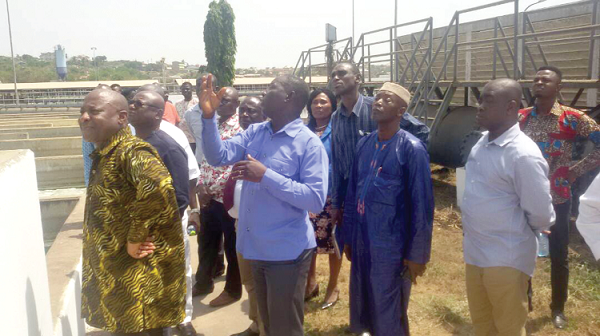
Accra to face acute water shortage — GWCL
The Ghana Water Company Limited (GWCL) has cautioned that Accra could face acute water shortage in the near future because the company currently operates its Weija and Kpong treatment plants at the highest capacity.
The Chief Manager of Accra Production, Mr Charles Brobbey, said even with the operation at the highest capacity, the company still had a deficit of about 30 million gallons per day, which had compelled it to manage water supply in the national capital.
Advertisement
As a result of the situation, he said, water supply to many communities in Accra would be curtailed or disrupted in case of any treatment shortfall in any of the treatment plants because of power challenges.
He, therefore, appealed to the government to urgently establish a new water treatment plant to cater for the shortfall in water supply and save the city from experiencing serious water shortage in the near future.
Appeal
Making the appeal during a visit to the Weija and the Kpong treatment plants by members of the Works and Housing Committee of Parliament last Monday, Mr Brobbey said a new treatment plant, with the capacity to treat and supply 40 million gallons a day, could cost about $300 million.
The members visited the Weija and the Kpong treatment plants to apprise themselves of the challenges facing the company and explore avenues to deal with them.
Mr Brobbey said the demand for water in Accra was about 150 million gallons a day, but the GWCL currently supplied about 120 million gallons daily, leaving a deficit of about 30 million gallons.
The Weija plant supplies 40 million gallons, while the Kpong plant supplies about 76 million gallons per day to Accra.
Mr Brobbey said the Kpong treatment plant had already built infrastructure to accommodate a new treatment plant with the capacity to treat and supply 40 million gallons per day.
Highest capacity
He said the increasing population and the expansion of Accra were some of the causes of the increasing demand for water in the city, a situation that had necessitated the need for the GWCL to operate the treatment plants at Weija and Kpong at the highest capacity.
He said even with the operation at the highest capacity, the company had to manage water supply to Accra, cutting water supply to some areas intermittently.
No water rationing
Mr Brobbey said the GWCL was not rationing water in Accra but rather continuing with its water management exercise.
He said the shutdown of the Accra Desalination Plant, which supplied 13 million gallons a day to Teshie and surrounding areas, had compelled the GWCL to produce at maximum capacity to supply to residents of Teshie and surrounding communities.
Challenges
Mr Brobbey said the activities of the people who had encroached on the catchment area of the Weija Dam were polluting the water, a development which had compelled the GWCL to spend so much money to buy more chemicals to clear the solid waste and kill all the germs in the water.
Committee Chairman
Responding to the concerns of the water company, the Chairman of the Works and Housing Committee of Parliament, Nana Amoakoh, said the committee would recommend the need for the government to support the GWCL to procure the 40 million gallons per day treatment plant.
He said once there was a deficit of about 30 million gallons a day in Accra, it was important for the government to help the GWCL procure the treatment plant capable of producing 40 million gallons of water a day.



